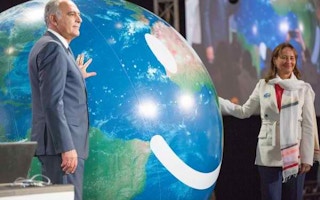The world’s new agreement on climate change entered into force Friday, less than 11 months after it was signed following a landmark negotiating session in Paris. That’s an almost unprecedentedly quick turnaround, analysts say, underscoring the political momentum the issue has established in capitals — and cities — around the globe.
Early adoption of the Paris Agreement comes on the eve of the first high-level follow-up conference. Starting Monday in Marrakesh, Morocco, and running through 18 November, the so-called COP 22 summit aims to turn the conversation decisively toward implementation of the new accord.
The speed with which the Paris Agreement has entered into force is “unprecedented in recent experience of international agreements”, said Patricia Espinosa, executive secretary of the U. N. Framework Convention on Climate Change (UNFCCC).
The voluntary agreement, which seeks to limit greenhouse-gas emissions to prevent an average global temperature rise over 1.5 degrees Celsius this century, crossed a key threshold last month when more than 55 countries, representing 55 per cent of global emissions, ratified its provisions.
Over the next two weeks, observers are looking to the Marrakesh meetings to turn that urgency into action. And implementation doesn’t just mean action that national governments can take, many are planning to emphasise at the talks.
“
One goal [in Marrakesh] is to make sure cities are fully integrated into the implementation of the Paris Agreement.
Emmanuelle Pinault, head of city diplomacy, C40 Cities Climate Leadership Group
Cities, which made a strong case in Paris that they are uniquely equipped to address climate change, anticipate the talks will further solidify and detail their role in responding to climate change, as formally recognised in the Paris Agreement.
“The early entry into force of the Paris Agreement is a wonderful breakthrough for all non-state actors committed to act against climate change,” said Emmanuelle Pinault, head of city diplomacy for the C40 Cities Climate Leadership Group. “It shows that nations were serious with their commitment last year and have at least understood the urgency to act.”
Local levels of governments are part of the constellation of actors in the Global Climate Action Agenda, a kind of parallel to the Paris Agreement’s national government commitments for what are known as non-state actors — cities and regions, businesses and NGOs, and more.
Yet while city proponents received landmark acknowledgement of their role at last year’s Paris talks, they now want to use COP 22 as an opportunity to build upon that recognition — to ensure that their actions are formally included in the mechanisms of the Paris Agreement going forward.
“One goal [in Marrakesh] is to make sure cities are fully integrated into the implementation of the Paris Agreement,” Pinault said.
Increasing cooperation
Over 1,000 mayors and local leaders converged on the French capital during last year’s climate talks — that round was known as COP 21 — to argue that cities already are taking critical action to combat global warming, building on months’ of climate pledges from local authorities. A follow-up gathering now will take place on 14 November, billed as the “Climate Summit for Local and Regional Leaders.”
U. N. officials expect the Marrakesh talks to accelerate work on the rulebook to achieve the Paris Agreement’s ambitious climate targets, as well as on the money required to do so. Nations are expected to use the next two weeks to further define a pathway by which developed countries can materialise the flow of USD 100 billion per year by 2020 that has been agreed upon to support climate action in developing countries.
Such financial commitments are crucial to meeting the U. N.’s major social priorities — both the climate-change targets and the international body’s larger development agenda, known as the Sustainable Development Goals, also finalised late last year. U. N. estimates suggest that achieving these goals will require USD 5-7 trillion a year, a large slice of which must fund the transition to a low-carbon global economy.
City advocates insist that whatever agreement nation-states reach, political actors at the local level are poised to go beyond such targets and to do so more quickly. For example, cities can scale up action immediately, rather than waiting until 2020, the first year when national governments are expected to deliver on their COP 21 commitments. Further, mobilising cities to do so could help countries get an important jump-start on fulfilling those pledges.
This story was published with permission from Citiscope, a nonprofit news outlet that covers innovations in cities around the world. More at Citiscope.org.










